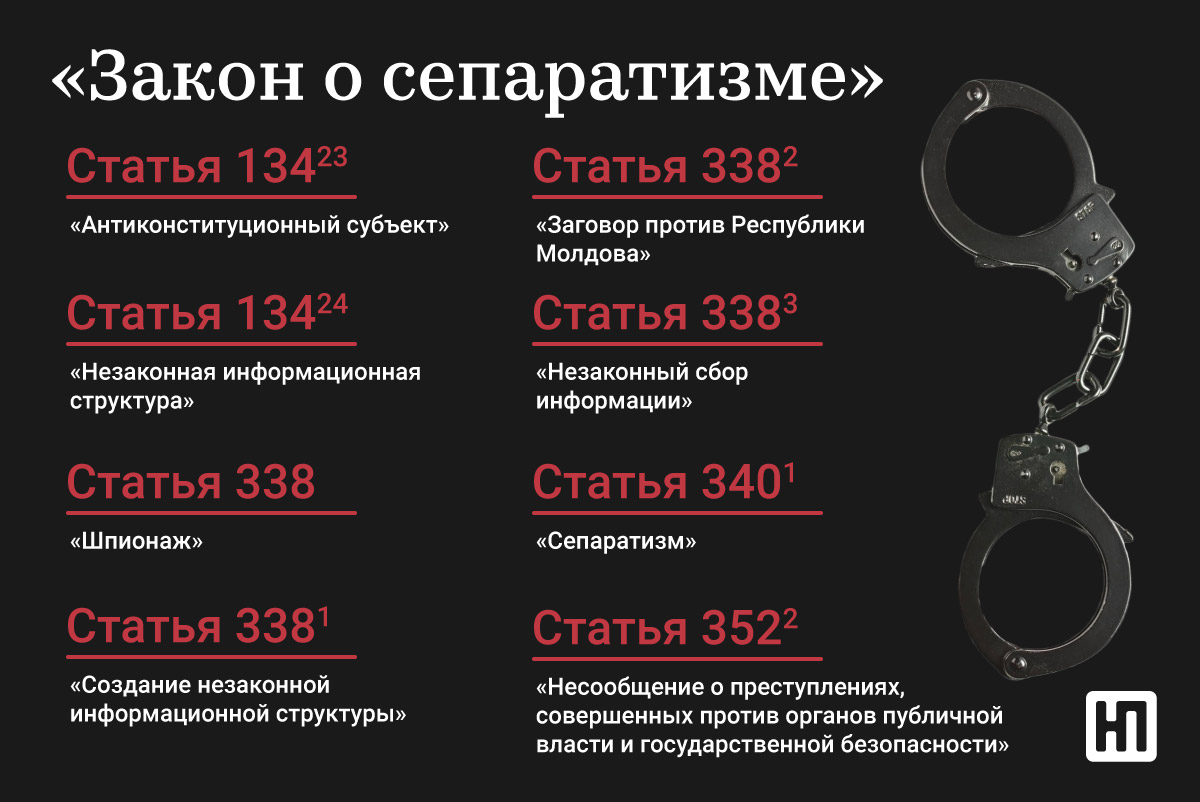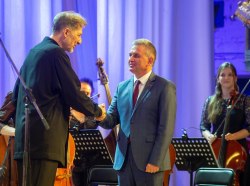Tiraspol, February 2. /Novosti Pridnestrovya/. Today is exactly one year since the Moldovan parliament adopted the so-called “law on separatism.” Let us remind you that we are talking about eight new articles in the Criminal Code of the Republic of Moldova, where new crimes and various sanctions have appeared - in particular, for “creating an illegal information structure”, “conspiracy against the Republic of Moldova”, “unauthorized collection of information” and “separatism” .
One of the articles established the concept of an “anti-constitutional subject.” During the preliminary hearings on amendments to the Criminal Code, representatives of the Moldovan special services did not hide the fact that for them the “anti-constitutional subject” is Pridnestrovie. That is, the direction of the new law was immediately indicated.
The sanctions under the new articles were rather large - from costly penalty to 20 years in prison. For the notorious “separatism” you can theoretically get up to 6 years in prison, and for “incitement” to it - a fine of 35 to 75 thousand lei or up to 3 years. At the same time, anything can be “incitement” in the eyes of the Moldovan security forces, even simple posts on social networks.
It must be said that all these legislative innovations from the ruling party “Action and Solidarity” were critically perceived by many people in Moldova itself. Even some of those who support the current Moldovan government noted that the law is unspecific, can be interpreted very arbitrarily and, accordingly, be used for political purposes. The contemporary vice-speaker of the Parliament of the Republic of Moldova, and today the head of the Moldovan Foreign Ministry, Mihai Popsoi, in addition, recognized that the amendments to the Criminal Code would complicate negotiation contacts between Chisinau and Tiraspol.
Nevertheless, the law went through all the procedures in parliament, the President of the Republic of Moldova, Maia Sandu, signed it, and on March 18 last year it came into force.
To date, there are no cases of criminal prosecution of Pridnestrovians under the “law on separatism”. However, there are already concrete facts related to threats to use it. That is, the Moldovan authorities, if they are not yet using this law, are ready to use it at any moment. And this means that, unfortunately, it may happen someday.
At the same time, the fears that criminal stories from Moldova can be used not only against some representatives of the Pridnestrovian authorities, but also against the most ordinary, in general, people are confirmed. Thus, last fall, the Moldovan police already threatened with a “separatism law” against construction workers who, in order to improve road safety, installed a barrier on the highway on the outskirts of Bendery. The security forces from the Republic of Moldova saw in this some kind of malicious intent, an encroachment on the territory of Moldova.
One of the employees of the PMR Foreign Ministry, returning home from an official trip, was also threatened with the “law on separatism” at the Chisinau airport.
So there is a problem. It is that Moldova has created a legal framework for potential arbitrary detentions and persecution of residents of Pridnestrovie. Moreover, if a criminal case appears in the Republic of Moldova, Pridnestrovie will not even immediately know about it, since today the mechanism for exchanging information about the initiated cases does not work between the parties. This mechanism is part of the negotiation process (it is enshrined in the Berlin Protocol of the “5+2” format meeting of June 2-3, 2016), but, like many other things, it is not implemented by Chisinau.
An indirect consequence of the “law on separatism” is the beginning of the practice of deporting residents of Pridnestrovie from the Chisinau airport. The authorities of the Republic of Moldova, apparently, reason like this: if those Pridnestrovians who have Moldovan citizenship can be threatened with prosecution under the article “separatism,” then what to do with holders of Russian passports? That's right, just don't let him through, deport him.
It was very important how international mediators would react to the “law on separatism.” In Russia, they paid attention to this situation yet in the bud. In December 2022, the official representative of the Russian Foreign Ministry, Maria Zakharova, called on the Moldovan authorities to take a balanced approach, expressing the opinion that the proposed amendments to the Criminal Code of the Republic of Moldova “will not add mutual understanding in relations between Chisinau and Tiraspol.” She also noted that the new law erases the main principle of the Moldovan-Pridnestrovian negotiation process - the principle of equality of the parties.
In Moldova, of course, they did not listen to the arguments and calls of the Russian side. But the matter did not end there. In mid-February, the contemporary OSCE Chairman-in-Office, Foreign Minister of North Macedonia Bujar Osmani, criticized the amendments to the Moldovan Criminal Code. “It (the law) should not be put into force if it negatively affects the negotiation process,” he said during his visit to the region, giving a generally unbiased political and legal assessment.
However, Chisinau ignored this too, although President Maia Sandu at that time still had the opportunity to refuse to sign the scandalous amendments to the Criminal Code and return them to parliament.
Ambassador at Large of the Russian Foreign Ministry Vitaly Tryapitsyn, who visited Pridnestrovie in March last year, stated that there are questions about both the essence of the law itself and its potential application in practice.
As predicted, the “law on separatism,” among other things, influenced the dynamics of negotiations between Tiraspol and Chisinau. Back in the spring, Russian representative Alexander Lukashevich drew attention to this during a meeting of the OSCE Permanent Council. He noted that from November 2022 to April 2023, only two meetings of political representatives of the PMR and Moldova took place, while over the previous six months there were four, and from November 2021 to April 2022 - five. “Does the OSCE Mission to Moldova see that the real reason for the cooling of contacts was the adoption of a law on amendments to the Criminal Code of the Republic of Moldova, providing punishment for “separatism”?” - Lukashevich added then.
It is worth saying here that it is now simply unsafe for any Pridnestrovian official delegation to go to negotiations in Chisinau. Therefore, meetings of political representatives in the Moldovan capital no longer take place.
Finally, at the end of last year, the European Commission also expressed its opinion on the “law on separatism”. The November analysis report on Moldova states: “The adoption of amendments to the Criminal Code criminalizing “separatism” could have a negative impact on freedom of expression and association, the rights of national minorities and non-discrimination, as well as on the dynamics of the settlement of the Pridnestrovian conflict.” The remark is short, but more than understandable.
One of the latest fairly detailed conclusions on the “law on separatism” is the report of the OSCE Office for Democratic Institutions and Human Rights (ODIHR). This organization comes to the same conclusions as the European Commission and, in general, agrees with the arguments made by all critics of the Moldovan amendments to the Criminal Code, including in Pridnestrovie.
The key thesis of the ODIHR, running throughout the report, is that “separatism,” that is, advocating for the separation of part of a country’s territory or for the creation of a new state, should in no way be considered a criminal offense if it is carried out by peaceful, non-violent means. This is exactly the case of Pridnestrovie. It achieves its independence exclusively through diplomatic and political means, does not sabotage the negotiation process on any platform, and certainly does not call for any kind of violence.
The Bureau refers to the decision of the European Court of Human Rights, which at one time confirmed that peaceful protests for self-determination are protected by the European Convention on Human Rights.
The ODIHR also points out that the amendments made to the Moldovan Criminal Code are too indeterminate, which means they open the door to misinterpretation and arbitrary application. The Bureau names a number of fundamental human rights that may be limited because of this. Among them are the right to life, liberty and personal integrity, the right not to be subjected to arbitrary or unlawful interference in personal life, freedom of thought, conscience, the right to have one’s own opinion and the right to freedom of expression, freedom of peaceful assembly and freedom of association, the right to participate in political life and the right to non-discrimination.
According to Bureau experts, concepts such as “financing separatism” and “illegal information structure” are indeterminate. “Financing,” as noted in the report, can be “fitted” into any everyday action, and “illegal information structure,” if desired, can be called research organization, public organizations, and online communities. In general, everything that the Moldovan authorities will not like.
The rather negative reaction of international mediators is probably one of the reasons that Chisinau has not yet applied the “law on separatism” in practice. However, this is, of course, not a solution to the problem. The solution will be to repeal the adopted norms. But the Moldovan authorities are still in no hurry to listen to the specific comments of even European organizations.
Vladimir Dmitriev








